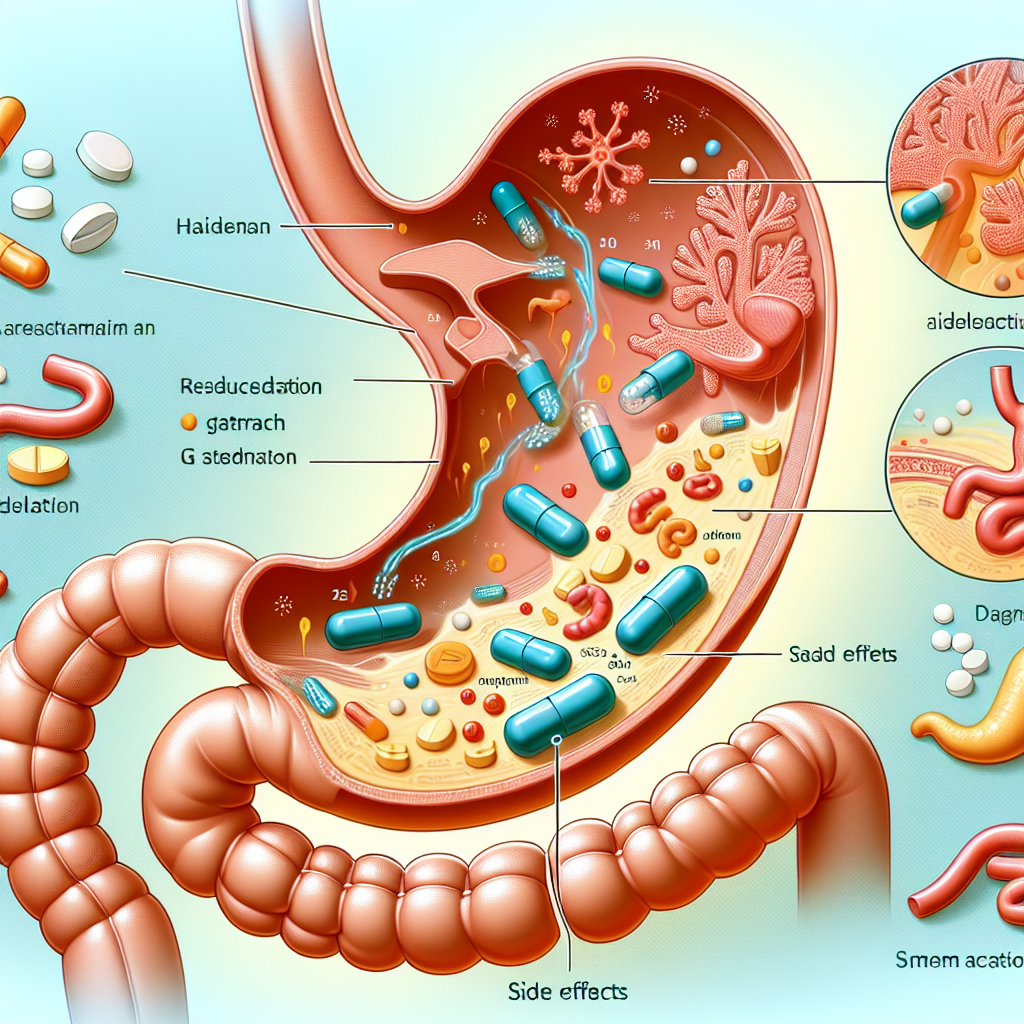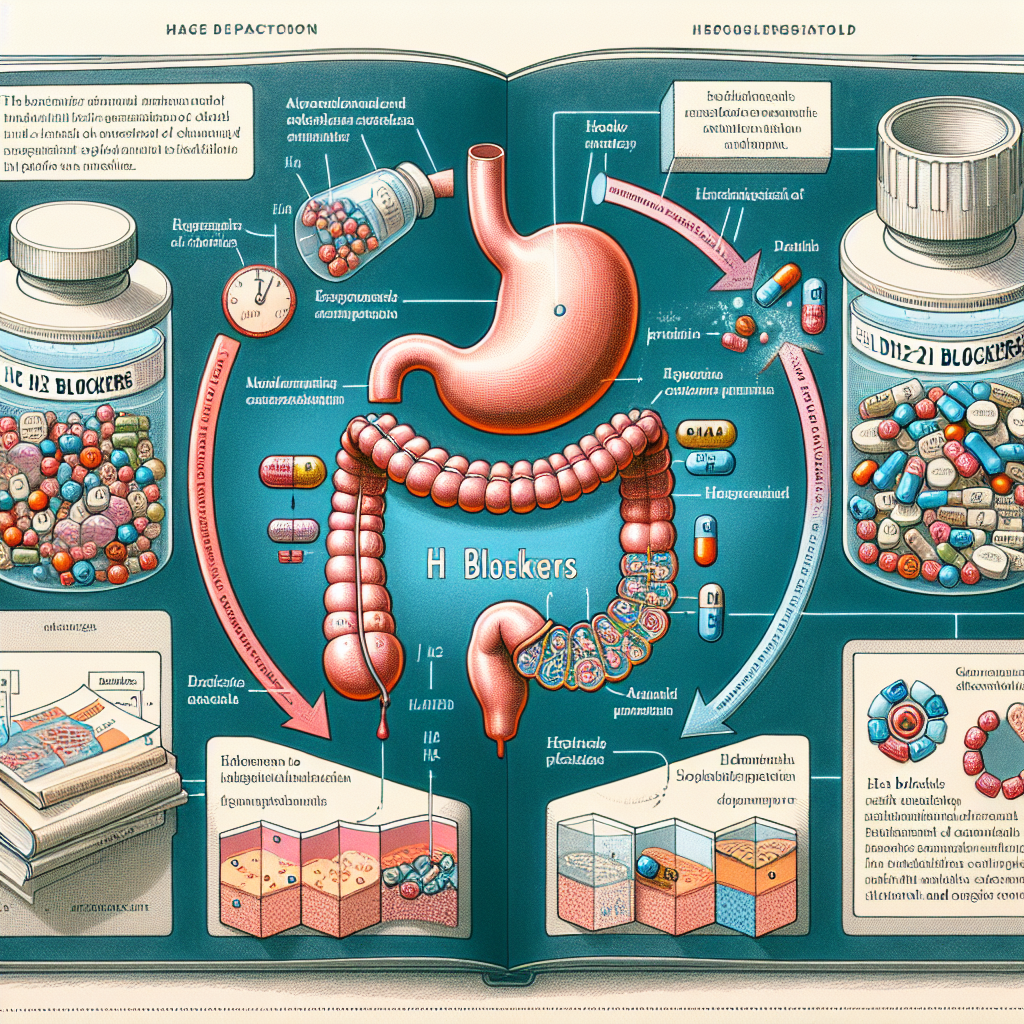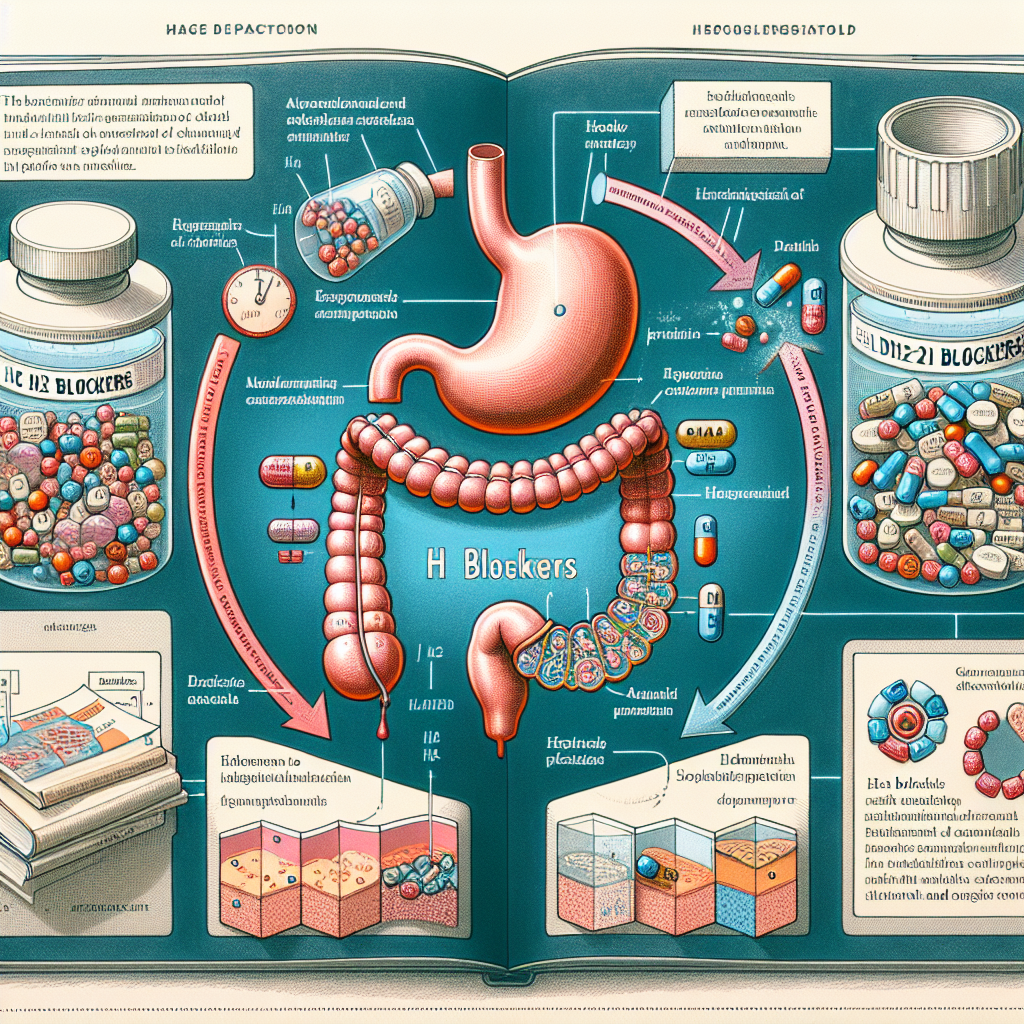Are you constantly grappling with the discomfort and irritation caused by acid reflux? If so, you’re not alone. Fortunately, there are solutions out there to help tame this pesky condition. In this article, we’ll give you the lowdown on H2 blockers and how they can bring relief from acid reflux. Say goodbye to those burning sensations and indigestion woes as we explore how these medications work and what benefits they can provide in managing your symptoms. So, grab yourself a cup of tea, sit back, and let’s delve into the world of H2 blockers.
What are H2 Blockers?
H2 blockers, also known as H2 receptor antagonists, are a group of medications commonly used to treat acid reflux and related conditions. They work by reducing the production of stomach acid, which helps alleviate symptoms and promotes healing of the esophagus. H2 blockers are available over-the-counter and by prescription, and they are generally safe and well-tolerated.
Mechanism of action
H2 blockers work by blocking the action of histamine on the H2 receptors in the stomach lining. Histamine is a chemical that triggers the release of stomach acid, so by inhibiting the H2 receptors, H2 blockers reduce the production of acid. This helps to alleviate the symptoms of acid reflux, such as heartburn and regurgitation.
Types of H2 Blockers
There are several different types of H2 blockers available on the market. Some common examples include ranitidine, famotidine, cimetidine, and nizatidine. While they all work in a similar way, the potency and duration of action may vary between different H2 blockers. It is always important to follow the specific instructions provided by your healthcare provider or the medication packaging.
Common brand names
H2 blockers are available under different brand names, and you may be familiar with some of them. Some commonly used brand names include Zantac, Pepcid, Tagamet, and Axid. However, it is important to note that these are just a few examples, and there are other brands available. When selecting an H2 blocker, it is important to consult with your healthcare provider or pharmacist to determine the most suitable option for your specific needs.
Symptoms of Acid Reflux
Acid reflux, also known as gastroesophageal reflux disease (GERD), can cause a range of uncomfortable symptoms. Here are some common symptoms associated with acid reflux:
Heartburn
Heartburn is a burning sensation or discomfort in the chest, often described as a feeling of acid rising up into the throat. It is one of the most common symptoms of acid reflux and can be triggered by certain foods, large meals, lying down after eating, or bending over.
Regurgitation
Regurgitation is the feeling of stomach acid or partially digested food coming back up into the mouth or throat. It can leave a sour or bitter taste and is often accompanied by a sensation of liquid or food coming back into the mouth.
Chest pain
Chest pain or discomfort is another symptom of acid reflux that can be mistaken for a heart attack. The pain may be sharp or burning and is usually felt behind the breastbone.
Difficulty swallowing
Some individuals with acid reflux may experience difficulty swallowing, also known as dysphagia. This can be due to acid-induced damage to the esophagus or the presence of a hiatal hernia, which compromises the normal swallowing mechanism.
Cough
A chronic, dry cough that worsens when lying down or after eating may be a symptom of acid reflux. The stomach acid irritates the respiratory system, leading to persistent coughing.
Hiccups
Although less common, hiccups can be a symptom of acid reflux. Hiccups occur when the diaphragm, the muscle responsible for breathing, contracts involuntarily. Acid reflux can irritate the diaphragm, triggering hiccups.

Causes of Acid Reflux
Understanding the underlying causes of acid reflux can help in managing and preventing symptoms. Some common causes include:
Hiatal Hernia
A hiatal hernia occurs when part of the stomach protrudes through the diaphragm into the chest cavity. This can weaken the lower esophageal sphincter, allowing stomach acid to flow back into the esophagus.
Weak Lower Esophageal Sphincter
The lower esophageal sphincter (LES) is a ring of muscle that separates the esophagus from the stomach. If the LES is weak or relaxes inappropriately, stomach acid can reflux into the esophagus, causing symptoms of acid reflux.
Obesity
Excess weight, particularly around the abdomen, can increase the pressure on the stomach and LES, making it easier for stomach acid to flow back into the esophagus.
Pregnancy
During pregnancy, hormonal changes and the growing uterus can put pressure on the stomach and LES, leading to acid reflux symptoms. This is a common occurrence and usually resolves after delivery.
Certain Foods and Drinks
Certain foods and drinks can trigger or worsen acid reflux symptoms. These may include fatty or fried foods, spicy foods, citrus fruits, tomatoes, chocolate, caffeine, alcohol, and carbonated beverages. Identifying and avoiding these triggers can help in managing acid reflux.
How H2 Blockers Work
H2 blockers work by reducing the production of stomach acid, which plays a key role in the development of acid reflux symptoms. Here’s how they work:
Reducing stomach acid production
H2 blockers specifically target the cells in the stomach lining that produce acid. By blocking the H2 receptors, these medications decrease the amount of acid secreted into the stomach, thereby reducing the acidity of gastric contents.
Blockage of histamine receptors
H2 blockers work by competitively blocking the action of histamine on the H2 receptors in the stomach. This prevents histamine from stimulating the release of stomach acid, helping to alleviate the symptoms of acid reflux.
Duration of action
The duration of action of H2 blockers can vary depending on the specific medication. Some H2 blockers provide relief for up to 12 hours, while others may require more frequent dosing. It is important to follow the dosing instructions provided by your healthcare provider or the medication packaging to ensure optimal effectiveness.

Benefits of H2 Blockers
H2 blockers offer several benefits in the management of acid reflux symptoms. Here are some key advantages:
Relief of acid reflux symptoms
H2 blockers provide quick relief from symptoms such as heartburn, regurgitation, and chest pain. By reducing stomach acid production, these medications help alleviate the uncomfortable sensations associated with acid reflux.
Healing and prevention of esophageal damage
By reducing the acidity of gastric contents, H2 blockers can promote healing of the esophagus and prevent further damage caused by prolonged exposure to stomach acid. This is particularly important for individuals with chronic acid reflux.
Reduction in the frequency and severity of symptoms
Regular use of H2 blockers can help decrease the frequency and severity of acid reflux symptoms. By maintaining lower levels of stomach acid, these medications can provide long-term relief and improve overall quality of life.
Dosage and Administration
Proper dosing and administration of H2 blockers are essential for optimal effectiveness and safety. Here are some guidelines to consider:
Initial dosing recommendations
Initial dosing recommendations for H2 blockers may vary depending on the specific medication and the severity of symptoms. It is important to follow the instructions provided by your healthcare provider or the medication packaging. In general, H2 blockers are taken orally, with or without food, and swallowed whole with a glass of water.
Adjusting dosage based on response
If symptoms persist or worsen despite initial treatment, it may be necessary to adjust the dosage of H2 blockers. This should be done in consultation with a healthcare provider to ensure appropriate management.
Guidelines for long-term use
H2 blockers are generally safe for long-term use under the guidance of a healthcare provider. However, it is important to follow up regularly with your healthcare provider to monitor symptoms, assess treatment effectiveness, and make any necessary adjustments to the dosage or treatment plan.
Potential Side Effects
While H2 blockers are generally well-tolerated, they can occasionally cause side effects. Here are some potential side effects to be aware of:
Headache
Headaches are a common side effect of H2 blockers but are typically mild and transient. If you experience persistent or severe headaches, it is advisable to consult your healthcare provider.
Nausea or vomiting
Some individuals may experience nausea or vomiting as a result of taking H2 blockers. Taking the medication with food or adjusting the dosage may help alleviate these symptoms.
Diarrhea or constipation
H2 blockers can occasionally disrupt normal bowel function, leading to diarrhea or constipation. Staying adequately hydrated, eating a balanced diet, and incorporating fiber-rich foods can help manage these symptoms.
Dizziness
In rare cases, H2 blockers may cause dizziness. If you experience dizziness or lightheadedness, it is recommended to avoid driving or operating heavy machinery until the symptoms subside.
Fatigue or weakness
Fatigue or weakness can occur as a side effect of H2 blockers, particularly in individuals who are elderly or have underlying medical conditions. If these symptoms persist or worsen, it is important to consult with a healthcare provider.
Precautions and Contraindications
While H2 blockers are generally safe, there are certain precautions and contraindications to be aware of. Here are some considerations:
Pregnancy and breastfeeding
H2 blockers are generally considered safe to use during pregnancy and while breastfeeding. However, it is important to consult with a healthcare provider before starting any medication during these periods.
Drug interactions
H2 blockers can interact with certain medications, including anticoagulants, anticonvulsants, and certain antifungal medications. It is crucial to inform your healthcare provider about all medications, supplements, and herbal remedies you are taking to ensure safe and effective treatment.
Underlying medical conditions
Individuals with certain medical conditions, such as kidney or liver disease, may require dose adjustments or closer monitoring when taking H2 blockers. It is important to disclose your complete medical history to your healthcare provider to minimize the risk of adverse effects.
Alternative Treatment Options
While H2 blockers are an effective treatment option for acid reflux, there are alternative approaches that may also be beneficial. Here are a few:
Antacids
Antacids are over-the-counter medications that neutralize stomach acid and provide temporary relief from acid reflux symptoms. They are often used in combination with H2 blockers for optimal symptom control.
Proton Pump Inhibitors (PPIs)
Proton pump inhibitors (PPIs) are another class of medications commonly used to treat acid reflux. They work by reducing the production of stomach acid, similar to H2 blockers. PPIs may be recommended for individuals who do not achieve sufficient symptom relief with H2 blockers alone.
Lifestyle modifications
In addition to medication, lifestyle modifications can play a crucial role in managing acid reflux. Some lifestyle changes that may help include maintaining a healthy weight, avoiding trigger foods and beverages, eating smaller meals, avoiding lying down immediately after eating, and raising the head of the bed.
Conclusion
H2 blockers are valuable medications in the management of acid reflux and related symptoms. By reducing stomach acid production and blocking histamine receptors, H2 blockers provide relief from heartburn, regurgitation, and other symptoms. They can also promote healing of the esophagus and reduce the frequency and severity of acid reflux episodes. However, it is important to consult with a healthcare provider before starting any medication and to follow their instructions for dosing and administration. Remember to discuss any potential side effects or concerns with your healthcare provider. By working closely with your healthcare team, you can find an effective treatment plan that meets your specific needs and helps you manage acid reflux symptoms effectively.
